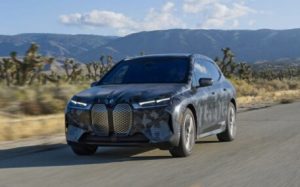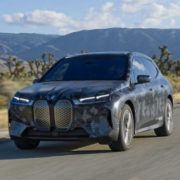BMW iX With ONE Battery Pack Drives 978 Km On Single Charge
1 week ago

ONE (Our Next Energy) is a battery company based in Michigan and headed by Mujeeb Ijaz, a 30 year industry veteran who has worked for Apple as a senior executive and for A123 Systems, where he led teams in developing EV battery systems.
He has a different approach to making batteries for electric cars, one that de-emphasizes expensive materials like cobalt and nickel. “We want to eliminate both nickel and cobalt, but we don’t want to give up energy density. We aim to re-invent battery chemistry as well as the cell architecture. We plan to build (batteries) in North America, and believe it can be done economically.”
CleanTechnica readers may remember ONE as the company that installed one of its experimental battery packs in a Tesla Model S two years ago and flogged it for 14 hours on a chilly Michigan winter day until it accumulated a total of 752 miles on a single charge.
A year ago, ONE revealed details of its new battery technology, which it said was anode-free with an energy density of 1007 Wh/liter. It believes the new battery has the highest energy density of any large-format cell ever produced. The new cell eliminates the need for graphite and anode manufacturing equipment, which could make it possible for manufacturing costs to be as low as $50 per kWh.
“Our prismatic anode-free cell is produced with approximately half of current cell manufacturing equipment for equivalent capacity, allowing us to sharply reduce scale-up cost,” said CEO Mujeeb Ijaz at that time.
ONE Powers BMW iX 978 Km
On November 30, 2023, ONE said it had equipped a BMW iX with one of its Genesis battery packs. The car then drove for a total of 978 km (608 miles) on a single charge, using the European WLTP testing standard. But this was no ordinary battery pack. It was actually configured like an electric car with a range extender engine, except in this case the range extender function was handled by a portion of the battery pack.
Conceptually the prototype BMW iX is configured like a BMW i3 REX, except that instead of having an internal combustion range extender engine onboard it has high energy battery cells that do the job of adding extra electrons to the main traction battery. No one else is doing anything quite like that, although some companies are experimenting with battery packs that combine two different battery chemistries in one pack.
How does that work? In a press release, ONE said the Gemini dual chemistry architecture contains two different cell types. Lithium iron phosphate (LFP) cells power the motor and meet the demands of 99 percent of daily trips with a range of 150 miles. For longer road trips, the Gemini uses high energy density anode-free cells to provides an additional 450 miles of range by transferring power through ONE’s proprietary high efficiency DC-to-DC converter, which allows the two cells to work together to offer more than 600 miles on a single charge. Gemini is the longest-range EV battery pack that fits in the typical 300-400 liter space available in a vehicle for energy storage, the company says.
In addition to extended range, ONE’s Gemini technology reduces lithium use by up to 20%, graphite by 60%, and minimizes the use of nickel and cobalt. In doing so, ONE is creating a more sustainable energy storage technology that can significantly reduce environmental impact and cost.
“The 600+ miles achieved by the BMW iX equipped with Gemini is an impressive demonstration,” said Jürgen Hildinger, BMW Group New Technologies Head of High Voltage Storage. “We enjoy working with the team at ONE and look forward to take the next steps together.”
ONE Gemini Battery
Last year, ONE signed an agreement with BMW Group to incorporate the Gemini battery technology into the BMW iX electric Sports Activity Vehicle. BMW i Ventures, the Silicon Valley-based venture capital arm of the automaker, is also an investor in ONE.
Now that ONE has successfully demonstrated the Gemini technology, the company will focus on further refinements to the system to prepare for commercialization. These include improving the efficiency of the DC-to-DC converter, developing enhanced control algorithms to optimize usage of the range extender cells, and conducting further battery validation and cell development. All these steps are intended to improve range and to prepare for the development of an A-sample for a full production program.
“Electric vehicles will achieve mass adoption when they offer enough range that people will feel comfortable having an EV as their only vehicle,” said Mujeeb Ijaz. “The Gemini battery has proven it can double the range of EVs and break down the biggest barrier to electrification.”
BMW To Use LFP Batteries In Neue Klasse Vehicles
BMW is covering all the bases when it comes to batteries. It has invested in Solid Power, a company that is working on solid state batteries. But it is also planning to use LFP batteries in its Neue Klasse electric cars due out in 2025.
According to Martin Schuster, the head of battery cell development at BMW, the decision to use LFP batteries has been finalized. Milan Nedeljković, member of the Board of Management of BMW AG, Production, confirmed LFP cells will be used in Neue Klasse vehicles scheduled to enter production in 2025 and added that new models using this battery chemistry will also be developed.
The common disadvantages of LFP batteries are well known, my colleague Jacek Fior says — lower energy density and poorer charging performance in lower temperatures. However, these matters have been continuously improved and their biggest advantage will play a critical role instead — that is the chemical composition itself.
Forget nickel and its soaring prices. Forget depending on rare raw materials available in limited locations. Welcome iron and phosphate — cheap, abundant, and available globally. In this light, BMW’s move is not so much smart as it is reasonable, he says.
“We need affordable EVs delivering on the promise of acceptable range and fast charging. And one thing we’ve come to see time and time again — if Tesla does it, everybody else will eventually. Disagreeing with Elon Musk on most of his opinions today, I still blindly follow him in the EV domain, and most major automakers do, too — even the ones that never admit that.”
Another big advantage of the ONE anode-free battery cells is they use much less graphite — almost all of which comes from China and is hard to find from any other source. It is clear that BMW is not worried about any slowdown in demand for electric cars and is prepared to be one of the leaders of the EV revolution.
Source:BMW iX With ONE Battery Pack Drives 978 Km On Single Charge – CleanTechnica




